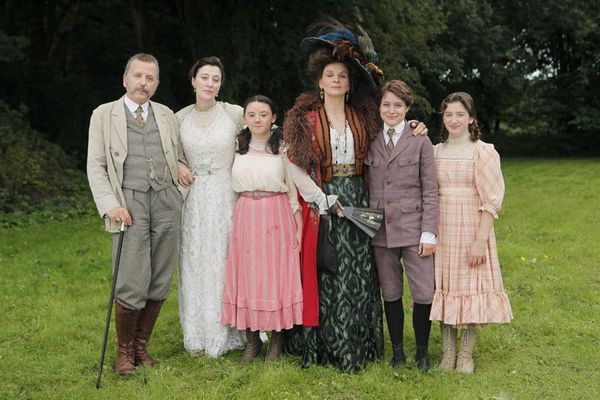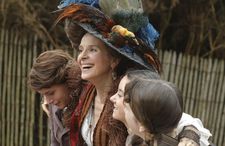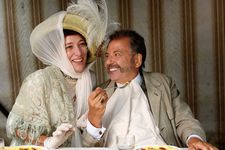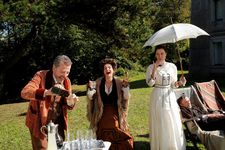 |
| Fabrice Luchini, Valeria Bruni Tedeschi, Lauréna Thellier, Juliette Binoche, Raph, Manon Royère as the Van Peteghems in Bruno Dumont's wild Slack Bay (Ma Loute) |
"I think each one of us has in us both some Brufort (Thierry Lavieville and Brandon Lavieville) and some Van Peteghem (see photo above)."
Bruno Dumont's latest, the musical Jeannette, L'Enfance De Jeanne d'Arc, will screen at the Cannes Film Festival where his Li'l Quinquin and Slack Bay (Ma Loute) had their world premieres. In our conversation the director/screenwriter discussed the character of the brother, Paul Claudel (Jean-Luc Vincent) in Camille Claudel 1915, the lens of the grotesque, pushing the grandparents in Li'l Quinquin to go beyond what is expected and how "grace is really within the reach of all of us."
 |
| Bruno Dumont on Camille Claudel 1915: "I think for me, using the grotesque, it's almost as though it were a lens." Photo: Anne-Katrin Titze |
When tourists start to disappear around the area in Slack Bay, two clueless police inspectors, paunchy Machin (Didier Després) and his flustered side-kick Malfoy (Cyril Rigaux), who lead the investigation, show their "humanity". The stumbling, bumbling characters are who we are.
Napoléon Bonaparte said that the sublime is only one step away from the ridiculous. Bruno Dumont proves that the opposite direction is just as true. The absurd exaggerations and the wild parishes of humour are never cruel, completely original and attached to a physicality that is pure cinema.
As Heinrich von Kleist explains in his writing about the marionette theatre, we sometimes have to circle the globe of artificiality and trespass into the mechanical before grace is regained.
Anne-Katrin Titze: The fact that father and son Brufort carry tourists across the Slack Bay has a mythic quality. At the same time, they are the donkeys, very realistically, they are the ones transporting them [the Van Peteghems and others]. They might be taking them to the Underworld. Did you have that in mind?
Bruno Dumont: I didn't specifically think of that. I found that the gesture of one person carrying another is something that really resonates with us. And maybe it does resonate for those very reasons that you mentioned. I really got the idea from postcards of the time. I saw the images on these postcards of these fishermen who would carry people from one side to the other.
 |
| Billie (Raph), Aude (Juliette Binoche), Gaby, (Lauréna Thellier), and Blanche (Manon Royère) Van Peteghem |
It's really a very beautiful gesture, this gesture of carrying. It's also interesting that it's a physical closeness between two groups of people that would never really frequent each other, would never be in contact with each other. And they're brought together in this physically very close way in the act of carrying.
AKT: Another thing that I felt was physical - and that in many films isn't - is the language, the way they speak. This exaggerated language of the Van Peteghem family becomes a physical expression as well. I don't remember the last time a film made me want to speak that way. I miss this possibility in real life. You never get a chance to speak that way. We don't hear it, we don't speak it.
BD: I think you have that feeling because this way of speaking, it doesn't exist in daily life. It's an exaggeration.
AKT: I looove the wisteeeeria!
BD: It's an exaggeration, but already it's a form of snobbery. I was looking at snobbery which in itself is a kind of exaggeration. Where you have these bourgeois people who speak in a way that is filled with hypocrisy. So that even the most mundane things become absolutely amazing and incredible.
 |
| Isabelle (Valeria Bruni Tedeschi) and André Van Peteghem (Fabrice Luchini) |
AKT: The smoke staaaacks! [outside the window here - Or as Fabrice Luchini says and drinks in Slack bay "Wisseki!"]
BD: It's a very duplicitous way of speaking as well. And this is an aspect of human beings - this ability to be duplicitous, to lie and to be hypocritical, while speaking in a way they are speaking. This is the first film I've made where the bourgeois are the focus. I find them fascinating. I find them crazy. And they lie and they do it in that exaggerated way - in a way that's quite false and almost unworthy.
AKT: That's true.
BD: You know, this attitude that these bourgeois reflect, I dealt with this once before in Camille Claudel [1915] with the character of the brother, Paul Claudel. He has that same kind of attitude, that same kind of - oh well, I can't really save my sister from this asylum because, you know, I'm not able to do it. So I was already exploring that with that character.
AKT: But because it's a film, you are able to go one step further. You transcend that. Like Heinrich von Kleist's On the Marionette Theatre - to find grace, once it's lost, you have to go through the machine, the puppet, in order to gain a certain grace. With the floating Virgin Mary miracle [in Slack Bay], I thought you were going in that direction.
 |
| Ma Loute (Brandon Lavieville) and Billie (Raph), police inspectors Machin (Didier Després) and Malfoy (Cyril Rigaux) |
BD: I think for me, using the grotesque, it's almost as though it were a lens. And by looking through the lens of the grotesque it exaggerates some of these characteristics so that we can get a close look. We can really examine the mechanisms that are operating. Yet, at the same time that we're seeing them, the grace is always nearby, it's contiguous to it.
Grace is contiguous to what's funny. It's this proximity of what is sublime with what is grotesque that you are able to show in film. For me, I think just because something is ridiculous it doesn't mean that it doesn't have grace. Grace is really within the reach of all of us.
AKT: The scene that comes to mind in this context, I'm not completely sure why, is the scene in Li'l Quinquin where the grandparents [Andrée Peuvion and Lucien Chaussoy] are setting the table - which is one of my absolute favorite moments. The absurdity and the grace of the grandparents doing it that way.
BD: Yes, it's a form of transgression. You're pushing further, you're going beyond what is expected. To the point where it becomes absolutely outrageous. So here you have the grandfather who is setting the table and it becomes such an outrageous act. You really see that he is throwing everything around.
 |
| "Wisseki!" for the Van Peteghems (Fabrice Luchini, Juliette Binoche, Valeria Bruni Tedeschi, Jean-Luc Vincent) |
It's the exaggeration of what is their reality. Because you have this push to exaggerate, you are able to show it, but in a way that is very human. Because for me, I don't find comedy and what's comic degrading. My attempt is to show that it's not degrading.
AKT: That's what makes it great.
BD: And here [in Slack Bay] the police inspector Machin, he falls all the time and it's really kind of funny. At the same time, it's not degrading because he really is this enormous character. It's a reflection of his humanity. I think each one of us has in us both some Brufort and some Van Peteghem and it's not simply a question of poor or rich. We all have both sides as aspects of our character.
Read what Bruno Dumont had to say on comedy, fantasy, miracles and Slack Bay(Ma Loute).
Slack Bay is in cinemas in the US.





















